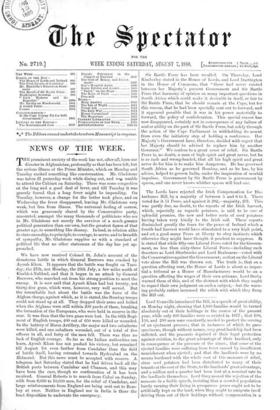We have now received Colonel St. John's account of the
disastrous battle in which General Barrows was crushed by Ayoub Khan. It appears that the battle was fought on Tues- day, the 27th, not Monday, the 26th July, a few miles north of Kushk-i-Nakhud, and that it began in an attack by General Burrows, who marched out from his strong position to meet the enemy. It is now said that Ayoub Khan had but twenty, not thirty-five guns, which were, however, very well served. But the remarkable fact about the battle was the force of the Afghan charge, against which, as it is stated, the Bombay troops could not stand up at all. They dropped their arms and bolted when the Afghans were still within 200 yards of them, breaking the formation of the Europeans, who were held in reserve in the rear. It was then that the two guns were lost. In the 66th Regi- ment of English troops, 400 out of 650 were killed or wounded. In the battery of Horse Artillery, the major and two subalterns were killed, and one subaltern wounded, out of a total of five officers in all, and forty of the men fell. There was thus no lack of English courage. So far as the Indian authorities can learn, Ayoub Khan has not pushed his victory, but remained till August 1st even farther from Candahar than the field of battle itself, having retreated towards Hyderabad on the Helmand. But this news must be accepted with reserve. A telegram last Saturday stated that he had driven back all the British posts between Candahar and Chaman, and this may have been the case, though no confirmation of it has been received. General Roberts is to march from Cabal on Sunday, with from 8,000 to 10,000 men, for the relief of Candahar, and large reinforcements from England are being sent out to Bom- bay at once. Neither in England nor in India is there the least disposition to underrate the emergency.


































